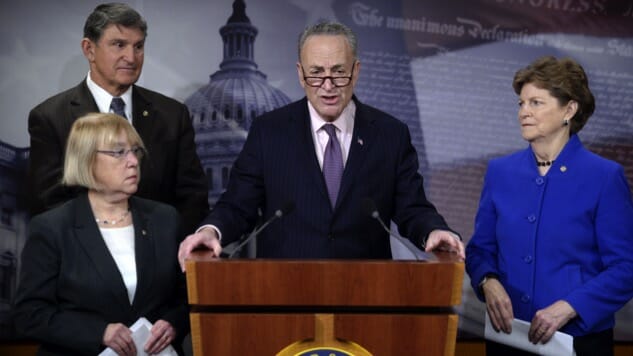The Democrats Need a Political Imagination
Photo by Oliver Douliery
Apart from last week’s victory keeping the Affordable Care Act in place, there aren’t a lot of reasons for progressives to feel optimistic about the current state of affairs. The ostensibly left-of-center party took a broad mandate given to them in 2008 by Barack Obama and, after huge losses in 2010, continued to be decimated at every level by conservatives, who’ve used gerrymandering, voter suppression tactics, and all other sorts of nonsense to cement their power. Even if Hillary Clinton had won the election, the Democrats would still be in pretty sorry shape all over the country.
But in this weird, uneasy time for the left, a batch of progressive organizations like Our Revolution are putting forward plans to take back seats in Congress and state legislatures from Republicans and—in some cases—challenge moderate and conservative Democrats as well. This week, Justice Democrats, a group co-founded by the Young Turks’ Cenk Uygur, blasted out an email taking aim at Democratic Senators Heidi Heitkamp (North Dakota), Mark Warner (Virginia), Claire McCaskill (Missouri), and Donald Trump’s new best friend, West Virginia’s Joe Manchin.
“If they won’t represent us, we will challenge these sell-outs in their next primary,” the email said. “It’s time [to] take over the Democratic Party and restore its purpose as a party for the people.”
Not so fast, wrote FiveThirtyEight’s Harry Enten. “I can see why progressives would be peeved with Manchin,” he said. “But it’s sort of silly to compare Manchin to the median Democrat. He represents West Virginia!”
The underlying assumption in Enten’s theory that Manchin is the best Democrats can do in 2018 is that current circumstances necessitate the candidates and platform they will need to win in two years, four years, and beyond. Liberals have to realize that Trump’s unpopularity and other factors mean that the current political moment is not the way things will always be, and that there is hope for progressives to come back in places, like West Virginia, that they’ve disappeared from.
It’s why they believed that the Obama coalition of 2008 was sure to remain in place in states like Wisconsin, Michigan, and Pennsylvania—all states which have elected Republican governors at least once in the past six years—no matter which candidate ran for president. And if they don’t prepare for future political circumstances, this lack of a political imagination will be why they let the opportunity to win the state in the future get away from them once it becomes a viable option.
A primary challenge is not a death sentence, and all things considered, it will probably not defeat Joe Manchin, who was a governor before he was a Senator and is a known commodity in West Virginia. But if Manchin were to lose a Democratic primary in West Virginia, there would be little reason to believe he could’ve actually pulled off a general election win in that state, considering how far both Blue Dogs and public opinion of incumbents in general have fallen since 2010.
But winning is not the only utility of primaries. Insurgent, anti-incumbent campaigns all across the country raise the profile of left-wing candidates, give needed campaign experience for young people getting involved in politics, and force incumbents to consider moving more to the left than they would without a challenge. Sure, the main point is that it’s a pressing need to replace Manchin, who voted to confirm Jeff Sessions as attorney general and Scott Pruitt as EPA chief, but it’s almost as necessary to start growing the left’s voice in West Virginia politics for future battles. A high-profile primary does that everywhere—which is why Democrats all over the country, not just Manchin, should be facing primaries in 2018 and 2020.
The evidence for why progressives need to take a different approach is in the reasons why national Democrats have faltered in West Virginia in the recent past. The long-term decline of steel and coal was exacerbated by NAFTA, which was a pillar of the Clinton legacy. During the recession, Republicans used the bogeyman of Obama administration regulations to great success as an explanation for why the state was still hemorrhaging jobs.
To a lot of people there, that probably sounded right on the mark: from 1994 to 2016, West Virginia lost a whopping forty percent of its manufacturing jobs, which has caused what one woman at a recent MSNBC town hall called “generational poverty” within the state.
“[Hillary Clinton’s] husband introduced NAFA,” a former steel worker told The Independent (UK) prior to the election. “If anyone in this state votes for her, they’re crazy.” Hillary Clinton’s flip-flop on the Trans-Pacific Partnership and her comment that she was “going to put a lot of coal miners and coal companies out of business,” even if it was taken out of context, didn’t help.
-

-

-

-

-

-

-

-

-

-

-

-

-

-

-

-

-

-

-

-

-

-

-

-

-

-

-

-

-

-

-

-

-

-

-

-

-

-

-

-








































